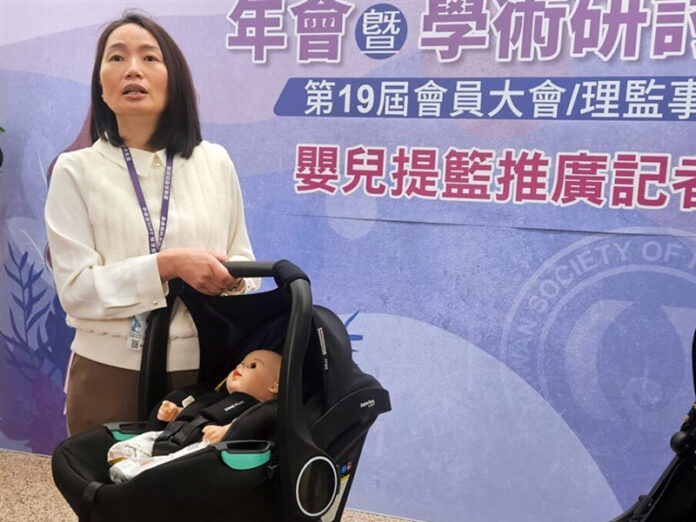TAIPEI, Taiwan – In a bid to improve child safety on the roads, the Taiwan Society of Perinatology held an awareness campaign on Sunday, promoting the benefits of rear-facing car seats for children. The event also highlighted the “First Day Home” program, which offers free one-year car seat rentals to expectant and new mothers, ensuring safer travels for infants.
The society’s press conference emphasized that a 2022-2023 Ministry of Health and Welfare review into the deaths of children under age 7 found 122 deaths considered “highly preventable”. Out of these, 79 were accident-related, with 16 fatalities occurring in traffic accidents. Among these, 6 deaths could have been avoided if the child had been in a proper car seat, the society explained.
Importance of Rear-Facing Car Seats for Infants
Despite the 2022 law requiring children up to age 2 to use rear-facing car seats, the Taiwan Society of Perinatology pointed out that many parents are still unaware of the safety risks of not following this rule. According to Chan Te-fu (詹德富), Chairman of the society, many parents underestimate the significant protection rear-facing car seats provide in the event of a crash.
Rear-facing car seats are specifically designed to safeguard the delicate head and neck of newborns and infants. Lin Shin-yu (林芯伃), an attending physician at National Taiwan University Hospital, stressed that newborns’ head and neck support is crucial due to their fragility. In a crash, if a newborn is carried in a regular baby carrier instead of a car seat, the child could be at risk of flying out due to the lack of secure harnessing.
The “First Day Home” Program
To make rear-facing car seats more accessible, the Taiwan Society of Perinatology partnered with Mommy Care (媽咪學苑) to launch the “First Day Home” program. The initiative offers free Hamilton infant car seat rentals to mothers for up to one year. This program aims to reduce the financial burden of purchasing a car seat while promoting safety for every newborn.
Mothers can rent a car seat by paying a NT$5,000 deposit (about US$154) and presenting their national ID card and a government-issued maternal health education handbook. The car seats can either be picked up from a designated location or delivered for a fee of NT$500.
Benefits of Rear-Facing Car Seats
Lu Hong-yi (呂泓逸), a doctor at Bobson Obs-Gyn Clinic in New Taipei City, emphasized the superior protection provided by rear-facing car seats. Studies have shown that these seats can reduce the risk of death in a car accident by up to 70% for infants. The positioning of rear-facing car seats ensures that the child’s body is properly protected by the car’s structure in the event of a crash.
FAQs
1. Why are rear-facing car seats important for infants?
Rear-facing car seats provide essential protection for a newborn’s delicate head, neck, and spine in the event of a car accident. This positioning helps reduce the risk of injury or death.
2. How can I rent a rear-facing car seat through the “First Day Home” program?
Expectant and new mothers can rent a rear-facing car seat by paying a NT$5,000 deposit, presenting their national ID card, and showing their maternal health education handbook. Seats can be picked up or delivered for a fee.
3. What are the key benefits of using a rear-facing car seat?
Rear-facing car seats reduce the risk of death in traffic accidents by more than 70%. They provide better support for a child’s fragile head and neck, especially during the early months.
4. When did Taiwan implement the law requiring rear-facing car seats?
Taiwan implemented the law requiring children up to age 2 to use rear-facing car seats starting in 2022.
5. How does the “First Day Home” program contribute to child safety?
The program offers free rentals of rear-facing car seats to ensure that all expectant mothers have access to this essential safety equipment without the financial burden of purchasing a car seat.
